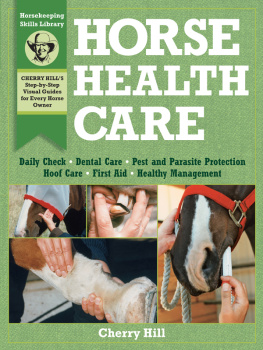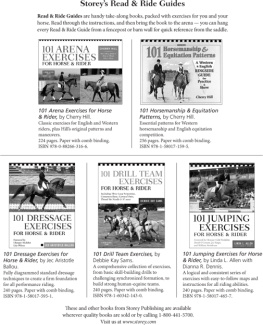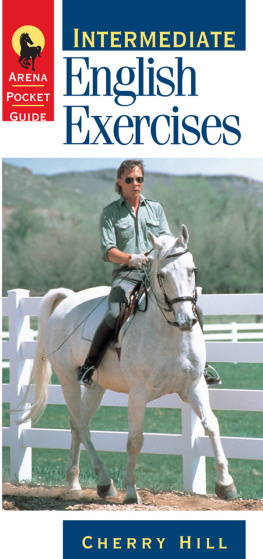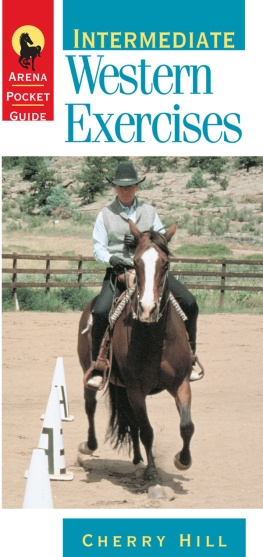Cherry Hill - Buying and Selling a Horse
Here you can read online Cherry Hill - Buying and Selling a Horse full text of the book (entire story) in english for free. Download pdf and epub, get meaning, cover and reviews about this ebook. year: 1991, publisher: Storey Publishing, LLC, genre: Children. Description of the work, (preface) as well as reviews are available. Best literature library LitArk.com created for fans of good reading and offers a wide selection of genres:
Romance novel
Science fiction
Adventure
Detective
Science
History
Home and family
Prose
Art
Politics
Computer
Non-fiction
Religion
Business
Children
Humor
Choose a favorite category and find really read worthwhile books. Enjoy immersion in the world of imagination, feel the emotions of the characters or learn something new for yourself, make an fascinating discovery.

- Book:Buying and Selling a Horse
- Author:
- Publisher:Storey Publishing, LLC
- Genre:
- Year:1991
- Rating:4 / 5
- Favourites:Add to favourites
- Your mark:
- 80
- 1
- 2
- 3
- 4
- 5
Buying and Selling a Horse: summary, description and annotation
We offer to read an annotation, description, summary or preface (depends on what the author of the book "Buying and Selling a Horse" wrote himself). If you haven't found the necessary information about the book — write in the comments, we will try to find it.
Buying and Selling a Horse — read online for free the complete book (whole text) full work
Below is the text of the book, divided by pages. System saving the place of the last page read, allows you to conveniently read the book "Buying and Selling a Horse" online for free, without having to search again every time where you left off. Put a bookmark, and you can go to the page where you finished reading at any time.
Font size:
Interval:
Bookmark:
by Cherry Hill
If you are in the market for a horse, there are many things for you to consider before you make the final decision on which horse you take home. Above all, invest the necessary time to become familiar with all aspects of choosing and buying a horse. Begin by reading this bulletin carefully several times. Being in a hurry is one of the most common pitfalls of horse buying. It can give way to enthusiastic and impulsive but often unwise buying.
Another common error made during horse purchases is pairing a green horse with a green rider. Parents sometimes buy a young horse for a young rider thinking they can grow up and learn together. Nothing could be further from the truth.
A novice needs a well-seasoned, dependable mount. Often, a beautiful, spirited, but untrained horse may catch your fancy, and it may be difficult to look at other less flashy prospects with objectivity. It is best, however, to follow your head rather than your heart when choosing your first horse. Although you may end up with an older and plainer (but perhaps wiser) horse than you originally dreamed of, the pleasant and safe riding will result in a positive experience. Later, when you are more familiar with training principles, you may be ready to progress to a less trained, more spirited horse.
When buying, it is wise to ask for, and pay for, professional adviceand then listen to it! When your instructor or veterinarian cautions you about a horse, it is for a reason. Conversely, if you are given the go-ahead to buy and then you get cold feet, you may not find as good a horse again. When procuring advice, it is best to use the view of an objective professional rather than the enthusiastic recommendation of an equally inexperienced friend. Hire a professional who has no vested interest in the horse sale.
Stay focused. Keep in mind that you are selecting a horse for a particular reason or performance event. There are many decisions and compromises lying ahead, so it helps if you set your priorities clearly at the outset.
If the overall purpose of the horse is to teach you how to ride, rather than how to win in the show ring, the selection process will emphasize different traits. If the horse is intended to be a long-term project rather than a stepping stone, you will have to invest more time, effort, and money in your purchase.
First you must realistically determine how much you can afford to spend on a horse. Remember, the purchase price is just a drop in the bucket when considering the numerous regular costs required for proper horse care. When setting your initial purchase price limit, ask yourself, Is this the most money I can afford? Long after the purchase price is but a dim memory, you will continue to pay for feed, tack and equipment, routine vaccinations, deworming, farrier care, dental work, bedding, and so on. Because both (backyard) Clyde and (the World Champion) King of Kings require the same dollar investment for proper care, set your purchase price ceiling as high as you can comfortably afford.
Then begin narrowing the field by considering the factors that, combined, determine a horses price. Rearrange the following list in accordance with your specific situation.
Temperament. The single most important requirement for a novices horse (and for that matter, anyones horse) is a willing and cooperative temperament. The horse should be calm and sensible yet keen. A keen horse is alert and ready to work but under control at all times.

Look for a horse with a kind, intelligent temperament.
Soundness. For a riding horse, working soundness is essential. An unsoundness is a condition that makes a horse unusable for a particular purpose. An example of a working unsoundness is a lameness that prevents a horse from moving correctly. A breeding unsoundness may prevent a mare from having a foal, but may have nothing to do with her suitability as a good riding horse.
Blemishes. Scars and irregularities that do not affect the serviceability of an animal are called blemishes. Although they are not considered unsoundnesses, they often lower the price of a horse. Old wire cuts, small muscle atrophies, and white spots from old injuries may detract from the horses appearance and may save the buyer money. Movement and Way of Going. Ideally, a horse should move smoothly and in balance, without stiffness and crookedness. Part of this is inherent and part of it comes from training and conditioning. Be sure you assess the horse at all three gaits. How comfortable is the ride? If you are just starting out, comfort is very important so you might be better off looking for an older model Cadillac.
Conformation. The overall structure of the horse will determine how smoothly and correctly it moves. The conformation should be suitable for the horse activity in which you are most interested. Many horses, however, are quite versatile and can perform in a variety of ways fairly well. Refer to the chart on page 10: Selecting A Horse for an Event.
Breed or Type. A high-level dressage horse will command a greater price than a weekend trail horse. An imported registered horse will likely cost many times the farm-raised, grade horse. If you do not need a registered horse for showing, you should consider purchasing a grade horse. What is most important is to select the type of horse that is best suited for your proposed event. Refer to the chart on page 10: Selecting A Horse for an Event.
Manners. A horses behavior when he is being handled, ridden, and even his behavior in a stall or pen, should be noted. Long-standing behavior is often difficult or impossible to change. Bad habits may lower a horses price but may provide you with more exasperation and aggravation than the discount is worth. Horses that are difficult to bathe or are slightly grouchy to cinch but perform beautifully under saddle may be an acceptable bargain. However, a horse that turns into a keg of dynamite and refuses to load when shown a trailer may be unusable. A horse that is difficult to shoe can become your farriers nightmare and a liability for you.
Also remember that a horses bad behaviors may be at their lowest intensity because of a professionals guidancethe habit may worsen with handling by a novice. Stall vices or bad habits can be dangerous for anyone and should be carefully considered before purchase. Stall vices include, but are not limited to, cribbing, wood chewing, stall kicking, weaving, pacing, pawing, rearing, and tail rubbing. Bad habits include balking, nibbling, biting, striking, kicking, bolting, halter pulling, rearing, and shying. If you are not certain how to recognize these undesirable behaviors, you should take an experienced horseman with you when you go horse shopping.

A horse with a bad habit such as kicking should be avoided.
Sex. Geldings usually make the most suitable horse for a novice because castrated males are reputably more steady in their daily moods. Stallions should never be considered for a first horse unless they are purchased young and with the intention of being castrated and then sent to a professional for thorough training. Mares often make brilliant performers but are often more expensive because of their breeding potential. Also with mares, there can be a period of silliness, irritation, or fussing each month due to the hormonal influences of the estrous cycle.
Font size:
Interval:
Bookmark:
Similar books «Buying and Selling a Horse»
Look at similar books to Buying and Selling a Horse. We have selected literature similar in name and meaning in the hope of providing readers with more options to find new, interesting, not yet read works.
Discussion, reviews of the book Buying and Selling a Horse and just readers' own opinions. Leave your comments, write what you think about the work, its meaning or the main characters. Specify what exactly you liked and what you didn't like, and why you think so.




